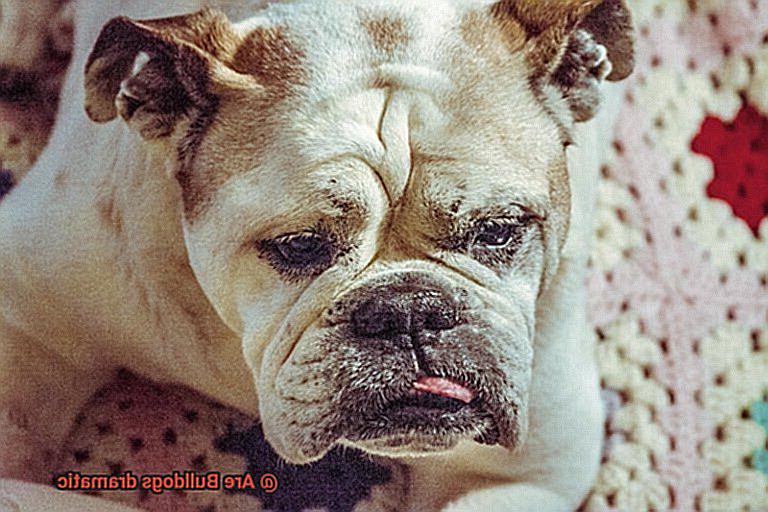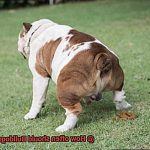Are Bulldogs dramatic?
Bulldogs, those lovable little divas that strut around with their wrinkled faces and droopy jowls, have a reputation for being drama queens. We’ve all seen it – the exaggerated cries that could wake the dead and the Oscar-worthy performances when they stub their toe on the coffee table. But don’t be fooled by their theatrics; there’s more to these dramatic doggos than meets the eye.
In this blog post, we’re going to dig deep into the world of Bulldogs and uncover the reasons behind their flair for drama. We’ll explore their origins, decode their attention-seeking behavior, and find out if there’s a method to their madness.
So whether you’re wondering why your Bulldog demands constant attention or considering adding one of these fabulous furballs to your family, get ready to be enlightened and entertained by the extraordinary lives of these four-legged performers. Brace yourself for a wild ride through Bulldog territory – where every day is an episode of “The Bold and the Bulldog-ious”.
What Are French Bulldogs?
Contents
Here, we will dive deeper into the world of Frenchies, exploring their origins, physical characteristics, temperament, and care needs.
Origins:
Originally bred in England as miniature versions of English Bulldogs, French Bulldogs found their true fame in France. They accompanied lace workers who migrated during the Industrial Revolution and quickly became a beloved breed. Today, they are cherished for their unique blend of elegance and playfulness.
Physical Characteristics:
French Bulldogs boast a compact and muscular body, standing at around 11 to 12 inches tall and weighing between 16 to 28 pounds. Their most iconic feature is their adorable bat-like ears that sit atop their square-shaped heads. With a short and smooth coat that comes in various colors, including brindle, fawn, white, and pied, they are truly a sight to behold.
Temperament:
French Bulldogs are known for their friendly and affectionate nature. They thrive on human companionship and love being part of a family. While they are sociable dogs that get along well with children and other pets when properly socialized, they can also exhibit a touch of stubbornness at times. However, with consistent training and positive reinforcement techniques, these minor challenges can be overcome.

Care Needs:
French Bulldogs require moderate exercise to keep them healthy and happy. Daily walks and interactive playtime sessions are usually sufficient to meet their activity needs. Due to their flat faces, they are prone to overheating, so it’s important to avoid intense exercise during hot weather. Regular grooming is also necessary to maintain their short coats and keep their wrinkles clean and dry.
Conclusion:
French Bulldogs are undeniably charming creatures that bring joy and laughter into our lives. From their adorable appearance to their affectionate nature, they make wonderful companions for individuals and families alike. However, it’s important to understand their unique traits and provide them with the care and attention they need. With proper training, socialization, and love, your Frenchie will be a loyal and cherished member of your family for years to come.
Origins:
French Bulldogs, also known as Frenchies, have a fascinating history that spans across England and France. Originally bred in England as miniature versions of English Bulldogs, these dogs found their true fame in France. During the Industrial Revolution, lace workers from Nottingham migrated to France, bringing their beloved bulldogs with them. The breed quickly gained popularity in France and earned the name “French Bulldogs.” Today, French Bulldogs are cherished for their unique blend of elegance and playfulness.
Typical Characteristics and Temperament of Bulldogs

First and foremost, Bulldogs are known for their unique appearance. With their muscular build, wrinkled face, and pushed-in nose, they possess a charm that is hard to resist. Adding to their appeal are their bat-like ears that give them an adorable and endearing look.

But it’s not just their looks that make Bulldogs special. Their temperament is equally remarkable. Despite their tough and intimidating exterior, Bulldogs are gentle and affectionate dogs. They have a reputation for being exceptional with children, displaying immense patience and tolerance towards little ones. If you have a young family, a Bulldog will be the perfect companion for your kids.
One standout trait of Bulldogs is their laid-back and easygoing nature. Unlike high-energy breeds, Bulldogs are content with moderate exercise and are well-suited for apartment living or for those who prefer a more relaxed lifestyle. They happily curl up on the couch with you and enjoy some quality snuggle time.
Another characteristic that sets Bulldogs apart is their loyalty and devotion to their owners. They form strong bonds with their humans and thrive on human attention and affection. Bulldogs want to be part of the family, always seeking opportunities to be close to their loved ones. Whether it’s following you around the house or cuddling up beside you on the bed, these little companions will always be by your side.
Now, let’s address a common misconception about Bulldogs – their supposed dramatic behavior. While it’s true that Bulldogs can sometimes display stubbornness, it’s important to understand that this is not drama but rather their strong will. They have a mind of their own and may resist training or refuse to follow commands at times. However, with consistent and patient training methods, Bulldogs can be trained effectively.

When it comes to getting along with other pets, Bulldogs are generally friendly. However, individual personalities may vary, so proper socialization during puppyhood is crucial to ensure they develop good relationships with other animals.
It’s also important to note that Bulldogs have a tendency to snore and drool due to their facial structure. So, if you’re considering getting a Bulldog, be prepared for some adorable snorts and slobbery kisses.
Lastly, Bulldogs are sensitive dogs. They don’t respond well to harsh training methods or rough handling. Positive reinforcement techniques work best with this breed, allowing them to thrive and show off their intelligence.
And let’s not forget about their sense of humor. Bulldogs have a knack for making us laugh with their silly antics and funny noises. They have a natural ability to bring joy and laughter into our lives.
Are Bulldogs Dramatic?
Firstly, we need to delve into the breed’s history and temperament. Bulldogs were originally bred for bull-baiting, a rather violent sport that required them to be strong-willed and tenacious. While modern Bulldogs have moved away from their aggressive past, traces of their ancestors’ traits can still be seen today.
This can sometimes manifest as drama, especially when they feel threatened or are seeking attention. It’s like they’re saying, “Look at me. I’m here and I deserve your full attention.”
Another factor to consider is their sensitive and emotional nature. Bulldogs are highly attuned to their environment and the emotions of their owners. This sensitivity can lead them to display dramatic reactions in certain situations. They might throw a tantrum or excessively whine if they feel neglected or ignored. It’s their way of saying, “Hey, pay attention to me. I need some love and affection right now.”
And let’s not forget their stubbornness. Bulldogs are notorious for being headstrong and determined. This stubbornness can contribute to their dramatic nature as they may become resistant or reluctant when faced with activities they don’t particularly enjoy or find uncomfortable. Picture this: you want to take your Bulldog for a walk, but it’s raining outside. Your Bulldog might dramatically refuse to go outside, giving you those sad puppy eyes as if to say, “I’m not stepping out in this weather. Find another way to entertain me.”
Now, it’s important to note that not all Bulldogs exhibit dramatic behaviors. Each dog has its own unique personality, and environmental factors also play a significant role in shaping their behavior. Proper training, socialization, and consistent boundaries can help minimize any dramatic tendencies your Bulldog may have.
Understanding the reasons behind your Bulldog’s dramatic behavior is key in addressing it effectively. Is it genuine distress or just attention-seeking behavior? If your Bulldog’s drama stems from fear or anxiety, creating a calm and secure environment for them is essential. And don’t hesitate to seek professional guidance if needed.
Behavior that May be Perceived as Dramatic
Lights, camera, action. French Bulldogs are true stars in the canine world, captivating us with their dramatic behaviors. From snorts and snores to attention-seeking antics, these lovable pups know how to steal the show. Let’s explore the behaviors that may be perceived as dramatic and unravel the reasons behind their captivating performances.
Snorts, Snores, and Wheezes:
Imagine your Frenchie sound asleep, snoring louder than a post-Thanksgiving dinner uncle. These amusing sounds stem from their unique anatomy. With their short, pushed-in faces, French Bulldogs can experience respiratory issues, resulting in symphonies of snorts and wheezes. Embrace these charming noises as part of their dramatic allure.
Attention Seekers Extraordinaire:
French Bulldogs are true divas when it comes to seeking attention. They paw at you, bark incessantly, and even throw tantrums. These attention-seeking antics are a testament to their love for companionship. Regular social interaction and showering them with cuddles and playtime can keep their dramatic side at bay.
Stubbornness: The Drama Queen Trait:
They have a mind of their own and aren’t afraid to show it. Resisting commands and training efforts may seem like a dramatic act on their part. However, patience and consistency are key to overcoming this trait. With time and positive reinforcement, you can transform your Frenchie into a well-behaved star.

Playful Shenanigans:
Get ready for some high-energy entertainment. French Bulldogs have a playful nature that can be mistaken for being overly dramatic. Zoomies, exuberant jumps, and rough play with other dogs are all part of their joyful spirit. Embrace their enthusiasm and join in the fun.
Separation Anxiety: Drama When Left Alone:
Lights, camera, separation anxiety. When left alone, French Bulldogs can turn into quite the drama kings and queens. Whining, howling, and furniture chewing are their cries for comfort and attention. Gradual desensitization and proper training can help them feel more at ease when you’re away, minimizing their dramatic side.
Expressive Faces: The Misunderstood Drama:
Their wrinkled brows and droopy jowls give French Bulldogs an expressive face that can be mistaken for constant drama. But don’t be fooled. Behind that perpetually worried or sad expression lies a gentle and loving dog just waiting to steal your heart.
Stubbornness as a Breed Characteristic
Along with their undeniable cuteness comes a reputation for stubbornness. In this blog post, we will explore why French Bulldogs can be stubborn and provide practical tips to effectively handle this breed characteristic.
Understanding the Stubborn Streak:
French Bulldogs have an innate tendency to be independent thinkers, which often manifests as stubbornness. This trait can be traced back to their history as working dogs, bred to make autonomous decisions to protect property or livestock.
While this stubborn streak may seem challenging at times, it’s important to remember that your Frenchie isn’t intentionally defying you; they simply have a strong sense of independence.
Dealing with Stubbornness:
- Patience is Key: Training your French Bulldog requires unwavering patience. Understand that it may take time for them to grasp commands and adapt to new routines. Consistency and repetition will be your most reliable allies in this process.
- Positive Reinforcement: French Bulldogs respond exceptionally well to positive reinforcement techniques. Utilize treats, toys, and abundant praise to reward them for good behavior. This will motivate them and make training sessions enjoyable for both of you.
- Consistency in Training: Establishing a consistent routine is crucial when dealing with a stubborn Frenchie. Stick to regular schedules for feeding, exercise, and training sessions. This will help them understand what is expected of them and reduce any confusion or resistance.
- Mental Stimulation: Bulldogs are intelligent dogs that thrive on mental stimulation. Incorporate puzzle toys, interactive games, and obedience exercises into their daily routine to keep their minds engaged. A mentally tired Frenchie is more likely to be cooperative and less inclined toward stubbornness.
- Seek Professional Help: If you encounter difficulties with your Frenchie’s stubbornness, don’t hesitate to seek professional assistance from a dog trainer or behaviorist specializing in bulldogs. They can provide personalized guidance and techniques tailored to your dog’s specific needs.
Sensitivity to Heat and Exercise
Sensitivity to Heat and Exercise: Keeping Your French Bulldog Cool and Comfortable
French Bulldogs are adorable and lovable companions, but they also have some unique needs that every owner should be aware of. One of the most important aspects to consider is their sensitivity to heat and exercise. Due to their brachycephalic (short-muzzled) faces, French Bulldogs have a harder time regulating their body temperature and breathing efficiently during physical activity. In this section, we will dive into the risks associated with their heat sensitivity and exercise intolerance, as well as provide practical tips on how to keep your furry friend safe and comfortable.
Heat Sensitivity:
French Bulldogs are prone to overheating, especially in hot and humid weather conditions. Their short snouts make it difficult for them to cool down through panting, which is the primary way dogs regulate their body temperature. As a result, they can quickly succumb to heat exhaustion or even heat stroke if not properly managed. To prevent this, it’s crucial to be mindful of the following:
- Avoid exercising your French Bulldog during the hottest parts of the day. Early morning or late evening walks are best.
- Provide access to shade and fresh water at all times. Ensure that your pup has a cool spot to retreat to when they need a break from the heat.
- Consider using cooling mats or vests to help regulate their body temperature. These products can provide some relief during hot weather.
- Never leave your French Bulldog unattended in a parked car or any other confined space. The temperature inside a car can rapidly rise, leading to dangerous heat levels.
Exercise Intolerance:
While regular physical activity is essential for your French Bulldog’s overall health, their exercise tolerance is limited due to their restricted airflow. It’s important to be aware of their limitations and provide appropriate levels of activity. Here are some tips to consider:
- Short walks or gentle play sessions are generally recommended. Pay attention to your pup’s breathing and overall comfort level during any activity.
- Avoid overexertion and provide breaks when necessary. French Bulldogs may quickly become tired, pant excessively, or show signs of distress if pushed too hard.
- Regular check-ups with a veterinarian can help determine the appropriate exercise routine for your individual French Bulldog. They can assess their overall health and provide tailored recommendations.
Additional Concerns:
It’s worth mentioning that French Bulldogs are also prone to other health issues such as obesity, which can worsen their heat sensitivity and exercise intolerance. Maintaining a healthy weight through a balanced diet and portion control is crucial for their overall well-being. Regular veterinary care and monitoring can help address any specific health concerns related to their sensitivity to heat and exercise.
Emotional Sensitivity of Bulldogs
Bulldogs, with their endearing appearance, possess an emotional sensitivity that sets them apart from other breeds. These captivating canines possess an innate ability to perceive and respond to their owners’ emotions. In this article, we delve into the emotional sensitivity of Bulldogs, exploring their empathetic nature, behaviors, and effective strategies for nurturing their emotional well-being.
Unmasking Bulldogs’ Emotional Sensitivity:
Bulldogs possess an exceptional sensitivity towards their owners’ emotions, astutely discerning even the most subtle shifts in mood. Their heightened emotional intelligence allows them to identify stress, sadness, or distress with remarkable accuracy. This leads them to display behaviors such as whining, pacing, or seeking increased attention.
Guiding Emotional Sensitivity:
To ensure optimal care for your Bulldog’s emotional well-being, it is vital to acknowledge and understand their emotional sensitivity while fostering a serene and stable environment. Here are some indispensable strategies to effectively guide and nurture your Bulldog’s emotional sensitivity:
- Training and Socialization: Commence training and socialization during their formative years. This equips them with coping mechanisms when faced with unfamiliar circumstances, diminishing the likelihood of dramatic reactions.
- Embrace Routine and Familiarity: Bulldogs thrive on routine and familiarity. Gradually introduce any alterations in their surroundings to alleviate emotional distress.
- Cultivate a Mindful Atmosphere: Mindfulness of your own emotions plays a pivotal role in maintaining a harmonious ambiance around your Bulldog. Negative energy can easily permeate their sensitive disposition, emphasizing the importance of cultivating a positive atmosphere.
- Comfort and Reassurance: During periods of heightened emotional sensitivity, offer your Bulldog solace and reassurance. Extra cuddles, soothing words, or a designated safe space provide them with the security they seek.
Conclusion
In conclusion, Bulldogs are indeed known for their dramatic nature.
Their expressive faces and unique personalities make them stand out in a crowd. From their theatrical sighs to their exaggerated pouts, Bulldogs have mastered the art of capturing attention.
Whether they’re demanding treats with a melodramatic display or throwing a tantrum over something as trivial as a misplaced toy, Bulldogs know how to make a scene. But behind all the theatrics lies a loyal and affectionate companion, ready to shower their loved ones with endless love and devotion.
So, if you’re prepared for a little extra drama in your life, then a Bulldog might just be the perfect addition to your family.




